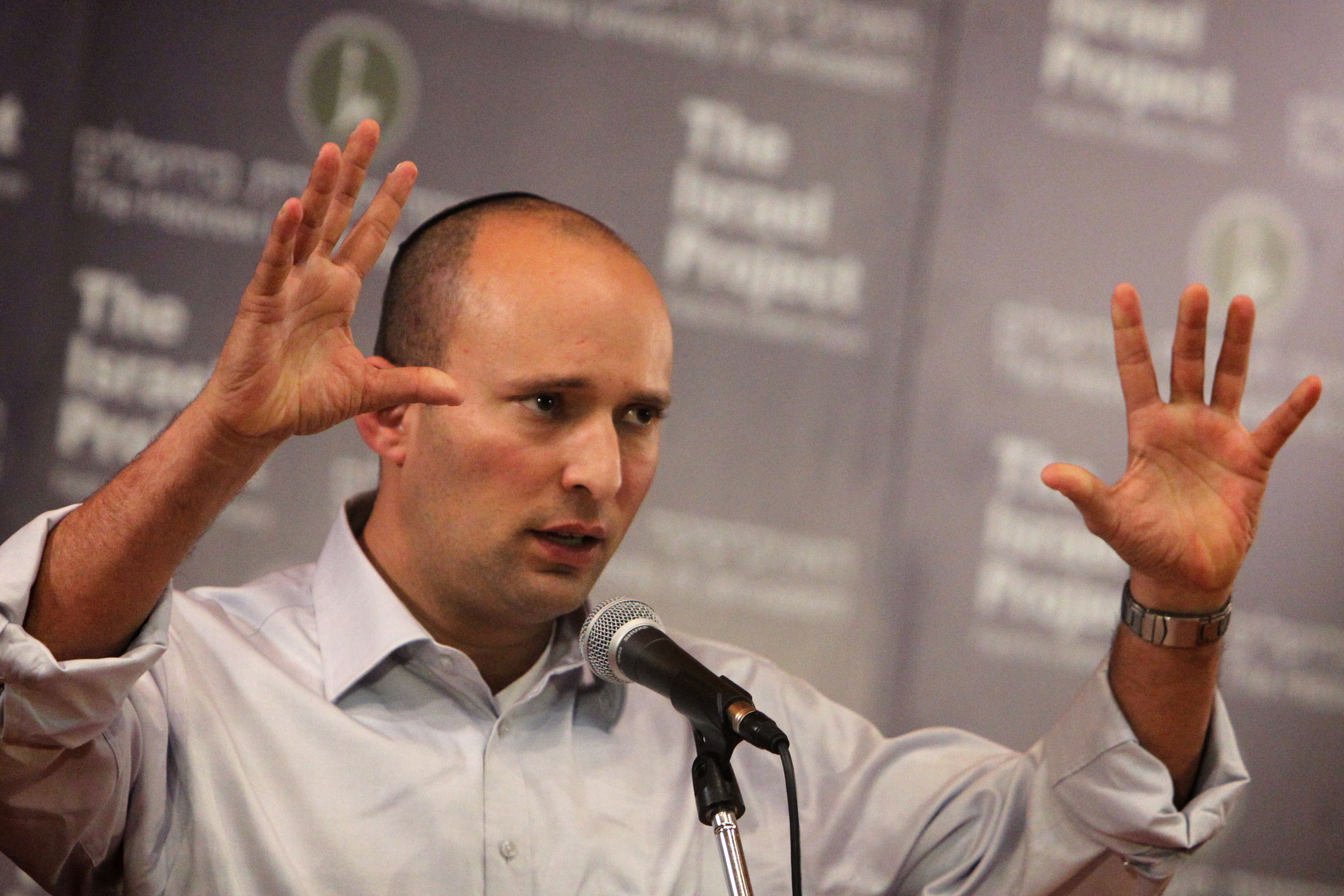 Israeli Minister of Education Naftali Bennett (Photo by Miriam Alster/Flash90/JTA)
Israeli Minister of Education Naftali Bennett (Photo by Miriam Alster/Flash90/JTA) Here’s an Israeli story that more than a few Americans would easily understand: it is the story of Israeli universities, tilted heavily leftward, and of the failed right-wing attempt to nudge them rightward. In the last couple of days, Israel has been abuzz over this issue, with the usual suspects singing the usual tunes. “Fascism,” sing the left and its university professors – “politization,” sing the right and its activists. Students threaten to strike. Lecturers vow to resist all attempts to silence them. And one philosopher, Prof. Asa Kasher, under a barrage of criticism, accuses them all of playing politics.
Kasher was asked by Education Minister Naftali Bennet to solve a problem – or what Bennet considers to be a problem. Universities are controlled by leftists and tolerate speech and action that is beyond the pale of Israeli public discourse. Universities employ professors supportive of boycotts against Israel. Universities brainwash their students by letting professors politicize their classes and make them a pulpit for radical ideas, all from the same political camp.
How can Kasher solve such a problem? Kasher has experience writing codes of ethics. He drafted the IDF code of ethics. So he was asked by the minister to write a code of ethics for campuses, in the hope that such a code would somewhat tame these tendencies of professors to play politics in classes. “The purpose of my document is to protect academia from political adulteration,” Kasher said on Sunday. The code includes instructions that would supposedly prevent teachers from using their position to advance a political agenda, although Kasher recognizes the obvious fact that not all political issues can be avoided in classes.
Yesterday, he was under attack. His colleagues in academia used harsh words to describe his code and the minister’s initiative. “The ethical code, proposed by Prof. Asa Kasher, undermines institutes of higher education’s freedom to decide their own codes of conduct for their academic staffs, and thus infringes on academic freedom in the most serious and fundamental way,” argued the umbrella organization of the heads of Israel’s universities. Kasher was called a censor, a fascist, dangerous, a mouthpiece.
Most of my critics, Kasher argues, did not bother reading the code, don’t know what it says. He describes the attacks on him as a Pavlovian response, as part of the problem that he is trying to remedy – a politization of academic discourse. “The problem that these people have with the ethical code is the problem they have with [minister] Bennett,” he said. “As soon as Bennett signed on, the left was opposed.”
He surely has a point, but his critics do not oppose the ethics code only because of Bennett’s involvement. They oppose it because they do not see a problem that needs solving. They oppose it because their fear of political meddling in their business is much stronger than their discomfort with the fringe elements in their midst.
Indeed – that is the key question as we observe the drama unfolding: is there a problem?
The answer is yes and no.
Yes – universities tilt leftward, and in many of their faculties there is no variety and diversity of views. In the last couple of days I heard some more horror stories about professors that occasionally harass students that come to classes in IDF uniform, about professors who use their time to preach against the government and its policies, and about professors who use derogatory terms when someone disagrees with their radical politics. It is easy to understand why a right-wing Minister of Education would be dissatisfied with such a situation and why he’d feel obligated to trigger a gradual change.
No – while universities tilt leftward, and while horror stories are not rare, it is still quite possible for a right-wing or centrist student to study, graduate, even excel at university. Students in Israel are not children. They are adults. They can handle annoying teachers without the need for constant protection. They might even benefit from the exposure to kooky views – views much different from their own. And as for severe cases of misbehavior – these can be handled on a case by case basis.
In other words: there is a problem, but it seems as if in this case Bennet decided to use a heavy hammer to solve a problem that is not a large nail. This is both damaging for the reputation of Israel and its universities and unwise, because it will fail. A high-profile battle between the Minister and academia might be good for him, politically speaking. It will not achieve what the right wants to achieve – in fact, needs to achieve: a gradual alteration of university tendencies and a weightier representation of conservative views in Israeli academic discourse.
An ethics code will grab the attention of the public for a few days, it will incite left against right and right against left, it will make headlines and ignite fury. An ethics code will not make a change, because universities are not like the military. They are not institutions with the hierarchy of the IDF, where all one needs is an ethics professor to write a code (an impressive, thoughtful, fine code in the IDF’s case) and the IDF leadership to make it mandatory for it to work. Universities are more elusive. Universities are more difficult to tame. Changing them will take years, not weeks or months. Changing them without ruining them, or severely damaging their reputation will take a nuanced, cautious, cunning approach.
If Bennet wants to make universities change, he will have to be smarter, and much more patient, and have a better plan. But who knows, maybe all he really wants is today’s headlines.























 More news and opinions than at a Shabbat dinner, right in your inbox.
More news and opinions than at a Shabbat dinner, right in your inbox.